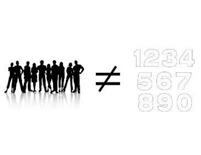Humans ≠ Numbers

Imagine a workspace of twelve-by-twelve cubicle after twelve-by-twelve cubicle filling the entire floor space. Common thought would consider this a boring place, not because of its lack of interesting features, but because of its sameness. Its sameness with all other offices in the world. The current method of herding and stabling the worker: accepted by all; liked by few. The lunchroom is a small, brief respite in the vanilla plain world, where the difference allows an openness otherwise neither considered nor accepted. “Can you believe that John is a department manager?” Asks one. “Yeah, if people were numbers on a spreadsheet or in an equation he might actually be good at it.” Another replies.
This is John’s domain; here he is king. A place where the laws of physics are supreme, where Bernoulli, Watt, Mohr, and others defined reality hundreds of years ago. He had proven himself an excellent engineer and been rewarded with his own serfdom. He would conquer this like he had engineering, merely by applying the rules and obtaining the desired outcome. This was not a difficult assignment, others had succeeded, and those who failed had clearly not properly applied the laws. As for workers who do not fit in, they are merely rounding errors. Ignore them, give them the undesirable project and soon enough they will leave.
In spite of the externalities most people are content, if not happy here. The engineering is interesting; the co-workers enjoyable. In general this place is as good as any to spend the required time among the employed. That is if you are not considered a rounding error. For those who choose to rebel against the sameness of this kingdom life is quite miserable. Yet the true problem lies not in those who rebel continuously but in the fact that human thoughts and behavior do not always obey the laws of physics that John would have rule this place. So everyone at one time or another (because independent thought and emotions cannot be quelled) at least visits the realm of the rebel.
When people cannot control that which makes them more than calculable figures, a confrontation with John will occur. Since no one has complete control of their humanness, emotions or thoughts, confrontation with John is inevitable. People either conform or leave; things continue to be the same. John, through lack of any introspection or lasting opposition, gains more power which reinforces his belief that people are numbers and he is as good at managing people as he is at engineering. The average worker remains relatively happy in spite of him.
This all too familiar narrative describes most engineer/managers to some extent. We must remember that people do not, in fact cannot, fit into equations. Just because ‘C’ looks like ‘A’ and ‘B’, they are not necessarily all the same. To use a concept that is criticized as fad by some and completely adopted by many in the management and leadership community the engineer/manager must know and improve their Emotional Intelligence. A good place to start would be using this psychtest evaluation tool. It will likely be eye opening and provide some feedback to fuel positive introspection on how you relate to employees, co-workers, clients, vendors, sub-consultants, and even family.

